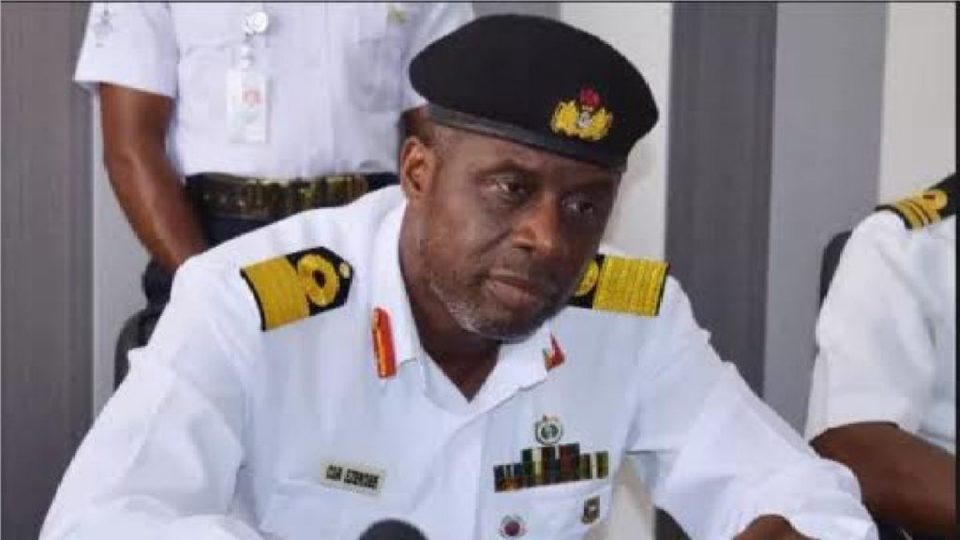The Chief of Naval Staff (CNS), Vice Adm. Awwal Gambo, has called for more cooperation among African nations to tackle maritime security challenges in the continent.
The CNS made the appeal in a keynote address at the ongoing Virtual Sea Power for African Symposium, on Tuesday in Abuja.
The theme of the symposium is “Integrating Africa’s Maritime Domain Awareness Infrastructure towards Effective Ocean Governance“.
Gambo said the symposium offered a veritable platform for African maritime nations to cooperate in addressing the continent’s maritime challenges.
“I am not only convinced that we will have a very astute discourse, but also optimistic that networks would be built that will further our collective resolve to establish effective ocean governance in Africa.
“I am also convinced that we can do better in spite diverse advancement we have made at diplomatic levels to concretise collaborative maritime security concepts,” he said.
Gambo reminded the participants of the increasing potentials of the Blue Economy which had expanded the duties, roles and responsibilities of navies and Maritime Law Enforcement agencies operating in African waters.
He also reminded the participants that over 90 per cent of African imports and exports were conveyed by sea.
This, he said, made it imperative to forge collaborative frameworks towards protecting the over 18,950 miles of coastline on the continent.
“Additionally, the exploration of natural resources is forging new frontiers.
“For instance, the huge natural gas reserves potentials on the continent amounting to a total of more than 800 trillion cubic feet.”
He noted that this would accelerate Blue Economy activities, as the production of natural gas is expected to expand by 80 per cent by 2035.
“As such, maritime security needs to be critical enabler of economic growth and prosperity for African countries,” he stressed.
He noted that the Nigerian Navy (NN), through the support of the Federal Government, had embarked on building institutional capacity for enhanced maritime governance.
This, he said, was typified by the inauguration of the `Falcon Eye Maritime Intelligence Facility, the Deep Blue Project, acquisition of different assets and capacity development programmes.
“We are indeed encouraged that our investments in maritime governance are yielding the required outputs with the recent drop in piracy incidents within our waters.
“Additionally, the Federal Government is working assiduously with different stakeholders and tiers of government in ensuring that the root causes of piracy and other maritime crimes are mitigated through non-kinetic programmes and constructive community engagements.”
The CNS expressed optimism that issues to be discussed, including hydrographic capacities, tackling emerging maritime security challenges, integrating Maritime Domain Awareness capabilities, would help to improve maritime governance.
Earlier, Minister of Defence, Retired Maj.-Gen. Bashir Magashi, noted that the symposium was apt, as the nation consolidates efforts in bringing down the rate in maritime criminalities.
Magashi expressed optimism that the forum would produce outcomes that would be beneficial to Africa’s collective efforts at improving maritime security.
The minister commended President Muhammadu Buhari for his untiring efforts towards the modernisation of the Armed Forces, especially the Navy.
He said the intervention included documentation and codification of enabling policy instruments aimed at achieving comprehensive maritime laws.
The Special Guest, Chief of Defence Staff, Gen. Lucky Irabor, commended African navies for organising the programme, saying it came at a time when African countries have resolved to fight maritime crimes.
Irabor said the event would avail African maritime nations the opportunity to evolve strategies for effective fight against maritime theft and other criminal activities in the African maritime environment.
The News Agency of Nigeria (NAN) reports that participants were drawn from 33 African countries, the AU, Regional and Maritime bodies such as Gulf of Guinea Commission and Regional Centre of Maritime Security in Central Africa.
The Sea Power for African Symposium was initiated by the chiefs of the navies of Ghana, Kenya, Nigeria and South Africa at the international Sea Power Symposium held in 2003 at Rhodes Island, U.S.
It was part of the collaborative framework encapsulated in the Africa Integrated Maritime Strategy 2050.
The maiden symposium was held in South Africa in 2005, followed by Nigeria in 2006, and in South Africa in 2009.




